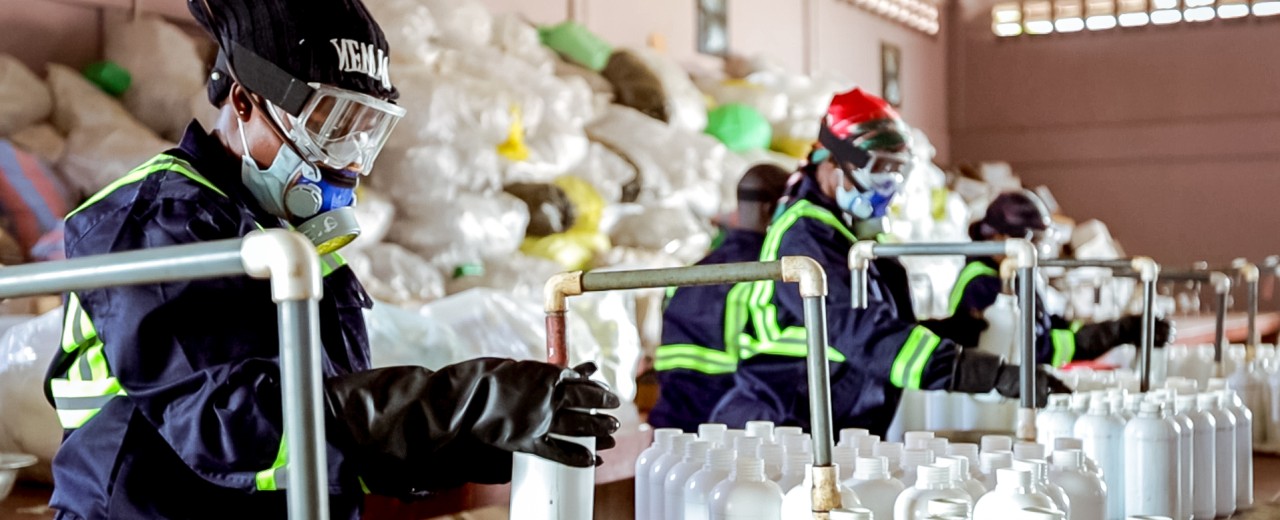
As of: 07/2024
The majority of companies in Ghana are small or medium-sized enterprises. They lack adequate access to needs-based financing as they have little collateral to offer – in some cases, they do not maintain formal record-keeping practices and are therefore perceived as particularly risky. The loans that would be available to them are informal, very expensive or have inappropriate terms.
Therefore KfW, acting on behalf of the German Federal Government, is working with the Development Bank Ghana founded in 2020 and supporting it in developing credit lines that are particularly tailored to the country’s small and medium-sized enterprises. The Development Bank Ghana uses KfW funds to provide long-term financing for transfer to partner financial institutions, which in turn offer it to the companies. These loans also help to boost economic activity and create new jobs.
In Ghana, small and medium-sized enterprises (SMEs) dominate the economy. The World Bank estimates that more than 90% of the country’s companies belong to this size category. They generate 70% of the gross domestic product and provide 80% of the jobs in the manufacturing industry. They are therefore the cornerstone of the country’s economy. However, they are barely able to expand or increase their productivity because they find it extremely difficult to obtain loans, especially long-term loans with reasonable terms and conditions. SMEs cannot provide sufficient collateral and are generally classified as particularly high-risk by commercial banks. The coronavirus pandemic and the effects of the Russian war of aggression on Ukraine have presented Ghana’s economy with additional challenges.
Ghana's state-owned development bank (Development Bank Ghana/DBG) was founded in 2020 and set up in line with KfW’s model. In addition to KfW, the World Bank, the European Investment Bank (EIB) and the African Development Bank (AfDB) were also involved in establishing the DBG. The aim is for the DBG to become the country’s leading provider of long-term financing on a sustainable basis and to use financing from partner financial institutions to finance loans for SMEs.

The DBG does not provide the loans for the SMEs itself, but through cooperation with private financial institutions, i.e. local commercial banks, microfinance institutions and cooperative banks (partner financial institutions). The target group comprises SMEs in the agricultural and manufacturing industries as well as services in the internet/communication, tourism, education and health sector areas. The DBG provides funds to existing partner financial institutions so that they can offer the long-term loans and other financial products that have so far been lacking on the market.
The DBG is therefore tackling four challenges at once:
On behalf of Germany's BMZ, KfW is providing the DBG with EUR 46.5 million in the form of a subordinated loan to facilitate long-term lending to SMEs. It is also providing an additional grant of EUR 3 million to strengthen the capacities of the DBG and the partner financial institutions.
The partner financial institutions are expanding their SME loan portfolio in the target sectors through the long-term financing provided by the DBG. The DBG selects participating partner financial institutions on the basis of transparent and objective criteria.
Further projects with the DBG are currently being prepared. These include the financing of a credit guarantee facility in the form of a subsidiary of the DBG and a project to support Ghana’s national climate contributions (Nationally Determined Contributions, NDC).
The project offers SMEs in Ghana access to financing as well as the opportunity to expand their businesses. The credit lines financed by the DBG, which are provided by partner financial institutions, improve access to long-term, affordable loans for SMEs, thereby enabling them to expand their activities. This secures and creates jobs.
By the end of 2023, the DBG had already distributed more than around 700 million cedis (Ghana’s national currency (GHS)/close to EUR 45 million) to SMEs via commercial banks, with close to 25% allocated to the agricultural sector.
Furthermore, this has created a better understanding of the needs of SMEs within the Ghanaian financial system. In challenging times in particular, this supports the core pillar of the national economy.
The DBG is committed to sustainability and climate financing. It was the first financial institution in the country to sign up to the United Nations Global Compact. This sets an example for compliance with international standards in Ghana’s financial sector.
The project contributes to the achievement of these following United Nations Sustainable Development Goals:
KfW Group
KfW Development Bank
Sustainable economic development and SI jobs in Central Africa
KfW Office Accra
Share page
To share the content of this page with your network, click on one of the icons below.
Note on data protection: When you share content, your personal data is transferred to the selected network.
Data protection
Alternatively, you can also copy the short link: https://www.kfw-entwicklungsbank.de/s/enzB08n9
Copy link Link copied